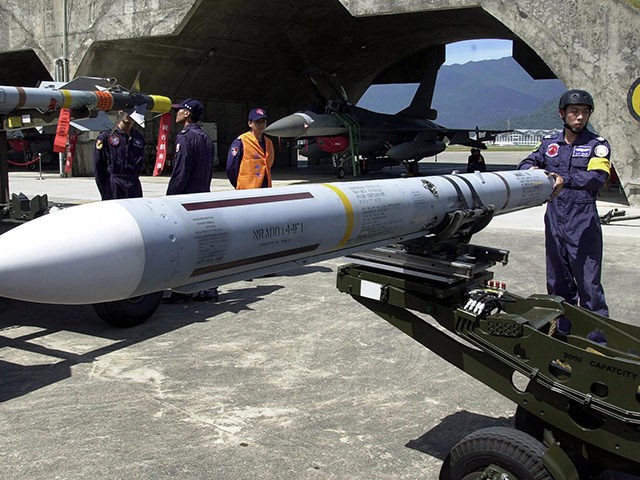China’s state-run Global Times issued the latest denunciation of U.S. arms sales to Taiwan on Tuesday, adding a threat to deliver the “ultimate warning” by sending the People’s Liberation Army (PLA) to “destroy” the weapons Taiwan purchased from America.
The Global Times was particularly exercised about the second large arms sale the Trump administration approved in October, a deal that would include a hundred Harpoon Coastal Defense System launchers and four hundred Harpoon anti-ship missiles to launch from them. The deal is valued at $2.37 billion. The Harpoon systems would give Taiwan a layer of coastal defense that would be extremely difficult for China to suppress before attempting an amphibious invasion or naval blockade.
Chinese media alternate between dismissing the venerable Harpoon as an insignificant obstacle to the highly advanced PLA Navy, and a deadly threat the PLA might have to take out with punitive strikes soon after they are delivered to Taiwan. The Global Times made that threat explicitly on Tuesday:
We must make it clear to Taiwan authorities that purchasing weapons, especially offensive ones on a large scale, from the US will never be accepted by the Chinese mainland. The mainland will therefore take punitive measures, just like military actions as a warning if higher-level US officials visit Taiwan. As a result, Taiwan’s purchase of US arms will be of no help in deterring the mainland, but the process itself is highly risky. The more US weapons the island buys, the more insecure it will become.
The mainland’s punitive measures will, first of all, include making it routine to fly military aircraft across the so-called middle line of the Taiwan Straits. The mainland can also dispatch its jets over the island of Taiwan, normalize aircraft patrols approaching the island, and launch economic blockade against the island.
If these still cannot curb the military collusion between the US and the island of Taiwan, the mainland can resort to the ultimate warning — the People’s Liberation Army would destroy the US offensive weapons Taiwan newly deploys. If Taiwan authorities refuse to be restrained, the mainland will end the dirty arms trade between the US and the island with a crisis. When there is a severe clash between the US, the Chinese mainland and the island of Taiwan, Taiwan authorities must be crushed first.
The Global Times implied the time has come to adjust Taiwan’s attitude with military force, since “the long-term peace in the Taiwan Straits has emboldened Taiwan secessionists,” while the governing Democratic Political Party (DPP) is “becoming increasingly unbridled, thinking they have gained more support from the U.S.”
The Trump administration has also approved plans to sell Taiwan more advanced equipment for its U.S.-made F-16 fighter jets, highly mobile truck-mounted rocket launchers, and underwater mines, all of which would be useful for deterring Chinese invasion strategies. The Chinese government pledged to impose unspecified sanctions on the American companies involved in supplying these weapons.
Taiwanese Deputy Defense Minister Chang Che-ping said on Tuesday that the latest American arms deal would help his forces “build up our combat power” until it becomes capable of destroying half of any Chinese invasion force by 2025. The new ground-based Harpoon missiles would be added to ship, sub, and aircraft-launched Harpoons already in Taiwan’s inventory, plus its domestically-produced Hsiung Feng anti-ship missiles. Military analysts believe Taiwan does not have enough Hsiung Feng missiles to deter Chinese invasion planners from believing they could largely neutralize Taiwanese coastal defenses with a pre-emptive strike.
“The second proposed sale in a week indicates the U.S. has gradually normalized its weapon supplies for Taiwan, unlike when Obama was president and all proposed sales had to reach a certain level before they would be reviewed and approved,” researcher Chieh Chung of Taiwan’s National Policy Foundation told the South China Morning Post on Tuesday.

COMMENTS
Please let us know if you're having issues with commenting.